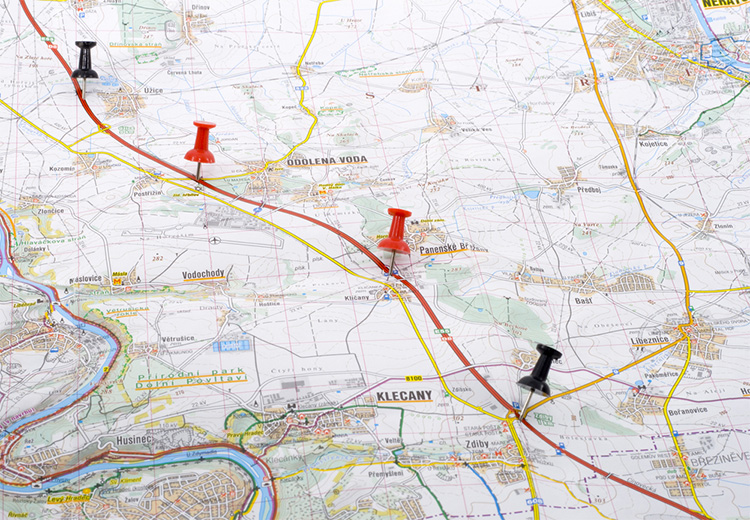Traditional business models have an increased likelihood of failure in today’s digital age. Regardless of their size, companies have to adapt or face losing their customer base to those that have already transitioned to make the most of modern technology.

Business survival rates don’t paint a good picture for small and medium enterprises (SMEs) in the UK – 80% of companies fail within their first year, and only 44% manage to keep their doors open for five years or longer. However, adopting a sophisticated management system could turn the tide for an establishment.
For businesses with vehicle fleets, constructive policies must be developed to ensure optimal resource management and sustainability. By investing in an advanced fleet management system, SMEs with vehicle fleets can expect cost reductions, more efficient resource management, and improved productivity, all of which serve to drastically boost revenue.
Fleet management systems can enhance every aspect of fleet operations, which can really make a difference to productivity and growth.
How GPS Works
The Global Positioning System (GPS) is a network of 31 satellites that orbit the Earth twice a day to provide worldwide coverage. They continuously broadcast radio signals containing location and status data, which are picked up by GPS receivers on the ground.
Tracking devices use the data transmitted from the satellites to calculate their distance from them. Once signals have been received from 4 or more satellites, the precise location of the device can be determined. Vehicle tracking systems can provide detailed coordinates as well as specific information about the tracked target, such as the speed and direction it’s traveling at.
Advanced management systems utilise GPS technology to provide real-time location and movement information about all the vehicles in a fleet, as well as temperature and fuel usage information. Telematics and GPS data have reshaped the way SMEs operate and boosted their productivity, with improved dispatching and route management processes, and instant alerts when certain events or incidents occur.
Improved Dispatching
Scheduling and dispatching issues are universal problems in the fleet industry. Without the right set of tools, it’s next to impossible to keep track of where your mobile assets and vehicles are at any given time.
GPS tracking systems allow dispatchers and field managers to pinpoint the exact position of vehicles and employees. Real-time geolocation data enables drivers to be diverted to customers in need and steered away from road maintenance points and traffic jams. While this might seem like a simple process, it can have massive implications if your business manages a vehicle fleet.
Not only will your drivers arrive at their destinations faster and be able to respond to customers more efficiently, but you will also save on fuel and maintenance costs. Considering that fuel is one of the biggest expenses for a fleet company, you will significantly reduce operational expenses while keeping your fleet healthier with little to no downtime.

Route Management
For decades, fleet managers have had to rely on crude methods involving paper trails and considerable guesswork to get their drivers to their destinations on time. Even with a smaller fleet, it is still a logistical nightmare to devise optimal routes and coordinate them with delivery times or service engagements.
Altering current routes to make course corrections for vehicles en route to help them reach their destinations on time is only the first step in improving productivity and operational efficiency.
The second step is to optimise future routes using previous route history data to improve fuel usage and delivery times. Appropriate route management has a profound effect on labour costs and fleet expenses. Your drivers will spend less time on the roads, with lower fuel consumption throughout your fleet, and even reduced overtime payments.
When your vehicles begin to reach their targets on time every time, your productivity will soar, with more job completions and more available vehicles to take on additional or unexpected work orders.
Emergency Assistance and Event Alerts
Studies suggest that employees who feel safer in the workplace are more productive and more focused on the tasks assigned to them. According to a report by Lockheed Martin, there is a direct connection between protective safety measures and work productivity; by developing a culture of safety within their plants, they were able to increase employee productivity by 24% while reducing costs by 20%.
GPS management systems can help field managers and dispatchers keep on top of security procedures, while emergency events and dangerous situations can be responded to quickly and safely.
Instant alerts are sent to immediately notify field managers about accidents or breakdowns, and real-time location data can be used to quickly locate the vehicle or employee in trouble. The appropriate medical help or roadside assistance can be promptly sent to tend to the situation.
Businesses tend to ignore safety risks to save money on security expenses and avoid affecting their delivery rates – but in the long run, these practices may have the opposite effect, with unexpected downtime and increased costs to fix inevitable issues.
Implementing ironclad safety policies and monitoring vehicles with vehicle tracking systems will greatly enhance the security of your work environment, letting your employees focus on their tasks instead of the dangers that await them, which will improve their output and efficiency.
![]()
Conclusion
With the fierce competition in today’s world, it has become imperative for businesses to adopt smart and efficient management systems.
UPS’s reports show just how effective a GPS-based fleet management system can be; in 2009, they fitted their delivery trucks with around 200 sensors to track telematics and GPS data, to determine how many deliveries they could complete in a single day. After 4 years of optimisation, UPS was able to handle 1.4 million extra packages per day, and with 1,000 fewer drivers.
Although not an SME, their results demonstrate the benefits of adopting a robust fleet management system – by reshaping business operations with GPS technology, SMEs can expect to cut costs and increase productivity by a large margin.
In a world where many SMEs barely survive their first year due to overwhelming operational expenses, GPS-based fleet management systems play a key role in increasing productivity through cost reductions and additional job orders. SMEs can sustain their fleet operations for longer, leaving them with surplus revenue to reinvest into their business.
Video – Logistics
Interesting Related Article: “What is a Global Positioning System (GPS)?”

